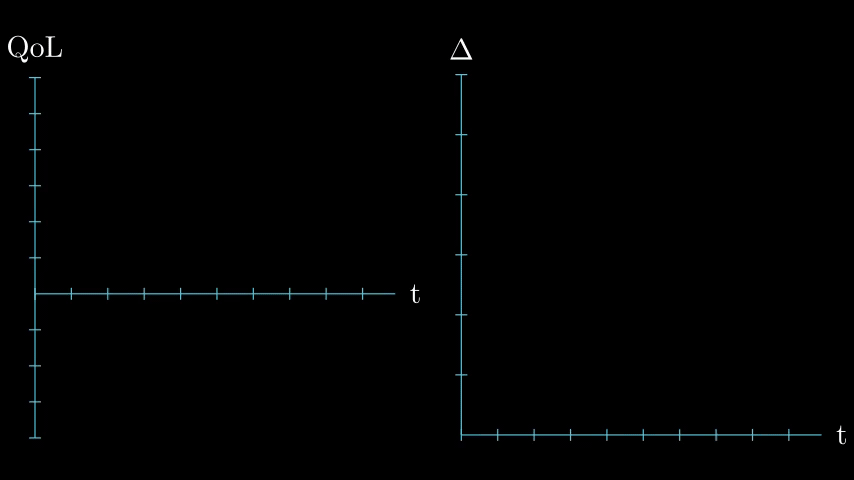Infinite Progress

Is the horizon for human progress infinite?
Can Economic growth and standards of living rise indefinitely?
In 2016 Robert Gordon published The Rise and Fall of American Growth about changes in the US standard of living from 1870-1970, and presented an ostensibly bearish thesis on the future of growth.
Weaving together a vivid narrative, historical anecdotes, and economic analysis, The Rise and Fall of American Growth challenges the view that economic growth will continue unabated, and demonstrates that the life-altering scale of innovations between 1870 and 1970 cannot be repeated [Amazon.com summary of Rise and Fall of American Growth]
This argument may look familiar to regular Allocator’s Mindset readers as standards of living and quality of life are tricky concepts that we discussed in the essay Levels & Derivatives.
Some of our perception of happiness is about change - and as we gain more and more quality of life we may run into diminishing returns which cause us to stagnate and become less happy.
To steel man Gordon’s argument: We started from the bottom in 1870, at the very base of an exponential slope, and now we’re here. Here is damn good and so we can’t expect future change to be that great. Mobile phones might be great but can they really even compare to the advent of running water or electricity?

Quality of life (QoL) vs Change in QoL (noted as Δ - Delta often used to signify change)
The counterpoint to this argument comes from the likes of David Deutsch and Ray Kurzweil who argue that we’re at the beginning of an infinite march of human progress through the development of technology and evolution of society.
Since 2016
Since the publication of Gordon’s book in 2016, less than 10 years ago as of this writing, we’ve seen a number of pivotal developments in technology.
- mRNA Vaccines
- Autonomous Vehicles
- Reusable rockets
- Massive cost curve changes in solar and battery technology
- Lab grown meat
- Wearable health tech devices
- AI with LLMs
- CRISPR Gene Editing Advances
- Human-computer brain implants
There are innumerable other developments that are still in earlier R&D phases but all of the above, in a less than 10 year period, are “shipped to production” and having a marked impact on the quality of life of people around the world.
As I researched and thought about this essay and looked at all the progress that has stacked up since 2016 I was actually a bit surprised by how much we’ve achieved and how meaningful these innovations are.
I think it is quite likely that science and technology are actually improving our lives in a more rapid and consequential way than most people realize. Even as an ardent technology optimist I think I was underrating things.
One of the criticisms of modern innovation is that we’re now nibbling around the edges on high class problems - not solving the big issues like clean water and power. This perspective is mistaken on two fronts.
First, many parts of the world still face challenges of the sort that America solved during the 1870-1970 period described in Gordon’s book. Important sources of innovation lead to solutions that can be more universal by becoming less capital intensive.
For example: Telephones were part of the 1870-1970 run of innovation - but required capital intensive wired build-outs which were done quickly in wealthy regions. Wireless connectivity, cheap batteries, and amazing performance/cost microchips are allowing globally poor populations to access a superior version of this technology at a fraction of the cost.
The future is already here - it’s just not evenly distributed - but sometimes it can leapfrog ahead.
Second, many of these most recent innovations radically improve health outcomes which are hardly trivial. Sickness and death stand as some of humanity's most persistent sources of suffering and anxiety.
We are now successfully curing some cancers with CRISPER edited Car-T cell therapies and appear to have made substantial progress in curing Sickle Cell Disease with similar technology.
The mRNA vaccine for COVID was not just effective - but it was developed in a few days using a combination of mRNA and AI technology within Moderna. This opens the door to an insanely exciting future of potential therapies including treating rare diseases and cancers. For a taste of what just one company is doing in this space you can listen to the Moderna R&D day call.
Lab grown meat is now a reality and could produce incredible nutrition, health, and poverty alleviation, while also reducing carbon emissions and improving animal welfare.
Self driving vehicles could virtually eliminate traffic deaths, the list goes on.
Accelerating Progress
The premise of David Deutsch’s The Beginning of Infinity is that human understanding and problem-solving can lead to unlimited growth and improvement across many domains, from science and ethics to politics and art.
One of the book’s conceptual foundations is an elementary mathematical truth: Wherever you sit within an infinite set you're always at the beginning of that infinite set due to the nature of infinity.
Deutsch argues that problems are inevitable—there will always be challenges—but they are also solvable. Human creativity and the ability to generate new knowledge allow us to tackle even the most difficult problems.
In a similar vein Ray Kurzweil’s books discuss the notion of the Law of Accelerating Returns - that is, in certain domains like computing or biotechnology, as our abilities increase our increased abilities feedback into our capacity for further innovation.
Kurzweil’s vision is a “see and raise” to Deutsch’s take - progress is both unbounded and accelerating.
Accelerating Difficulty
In his latest book Kurzweil discusses being asked why we don’t see the remarkable growth caused by technology to show up in the economic data.
The answer he gives is compellingly clear: It’s because the metrics we use are flawed. Specifically he says that technology’s economic impact is in both the “numerator and denominator.”
He uses the example of the cell phone - this one device now does so much for us - it’s a music player, camera, diary, map, phone, television, and infinitely more things. This is an enormous value (growth - numerator) but also removes a lot of economic activity because I now buy one device instead of 20 - and this decreases the amount of spending making it deflationary.
This is an example of Joseph Schumpeter’s creative destruction. The smart phone destroyed the pile of plastic devices and gave you more utility - but also removed some previous economic activity from the metrics.
As we deliver ever high standards of living - the bar continues to get raised for how much we need to innovate to have an _even higher_ standard of living.
I believe the fascinating paradox here is that two forces at work here, both racing forward with crazy exponential growth (progress, difficulty of producing progress) essentially cancel out into the long run growth rate we see in our stock market - say 7% real growth.

Two rapidly growing exponential functions can have a remarkably constant ratio
The exponential growth shown in that fraction looks like this if you chart it as a time series:

Two rapidly growing exponential functions
Mindset matters
Deutsch advocates for a stance of optimism, not in the naive sense that "everything will be fine" but in the sense that, with the right approach and continued inquiry, solutions to all problems can be found.
A few years ago I was talking to an extremely talented machine learning expert I know who was trying to decide what to work on. He made a comment to the effect of “Oh I would work on {BIG_CONSEQUENTIAL_PROBLEM} but.. Someone smart always comes along to solve a big problem like that so I should probably do something else more niche”
I argued that my friend is exactly the sort of person who could solve a problem like that and that this sort of “market efficiency” belief may harmfully dissuade necessary levels of investment by smart people who can create a lot of improvements for society.
It is essential that we teach our children and ourselves to be ambitious and optimistic about how much better our lives can become. In the parlance of Charles C. Mann’s excellent book The Wizard and the Prophet - we should all become Wizards - those who believe we can manifest the technology and cooperation to overcome any challenge.
If we have a fixed or static view of human progress and subscribe to the prophet rather than wizard path - and this will then take us along that path as a self fulfilling prophecy. Down the “static” mindset path as Deutsch describes we are more or less guaranteed static outcomes.
If we strive for the dynamic/growth/infinite path we may see great returns. It is possible that we'll fail, but the probability of failure is necessarily less than that static mindset path which all but guarantees failure.
It would be hard to identify two more potent ingredients for happiness than hope and experienced improvement. The static path gives us neither hope nor improvement.
If you enjoy reading Allocator Mindset please share posts with your friends or email me thoughts, feedback, and book recommendations.




